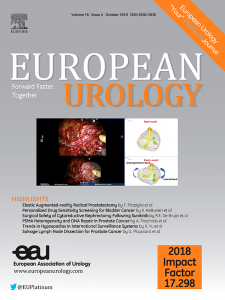T-cell Engagers in Prostate Cancer
IF 25.3
1区 医学
Q1 UROLOGY & NEPHROLOGY
引用次数: 0
Abstract
Owing to the “cold” tumor immune microenvironment of prostate cancer, immune-targeting agents have shown limited efficacy in patients with advanced prostate cancer, highlighting the need for new therapies with novel mechanisms of action. In this context, T-cell engagers (TCEs), which induce T-cell–mediated killing of cancer cells by binding the CD3 receptor on T cells and a specific tumor antigen expressed on malignant cells, represent a promising therapeutic option. Multiple studies have explored the use of TCEs in previously treated patients with metastatic castration-resistant prostate cancer, and several ongoing trials are currently assessing novel TCEs either as single agents or in combinatorial regimens with molecules with a distinct mechanism of action (eg, androgen receptor pathway inhibitors and other immune-targeting agents). Although TCEs have shown promising antitumor activity with prostate-specific antigen and radiographic responses, they still face considerable challenges that prevent their implementation into clinical practice. These include their immunogenicity and the development of antidrug antibodies, which could impact their serum drug exposure, as well as their toxicity profile involving cytokine release syndrome and other immune-related adverse events. To improve their efficacy and pending the results of ongoing trials, there could be a role for combinatorial regimens, administration in earlier lines of therapy, and biomarker-driven selection.
求助全文
约1分钟内获得全文
求助全文
来源期刊

European urology
医学-泌尿学与肾脏学
CiteScore
43.00
自引率
2.60%
发文量
1753
审稿时长
23 days
期刊介绍:
European Urology is a peer-reviewed journal that publishes original articles and reviews on a broad spectrum of urological issues. Covering topics such as oncology, impotence, infertility, pediatrics, lithiasis and endourology, the journal also highlights recent advances in techniques, instrumentation, surgery, and pediatric urology. This comprehensive approach provides readers with an in-depth guide to international developments in urology.
 求助内容:
求助内容: 应助结果提醒方式:
应助结果提醒方式:


